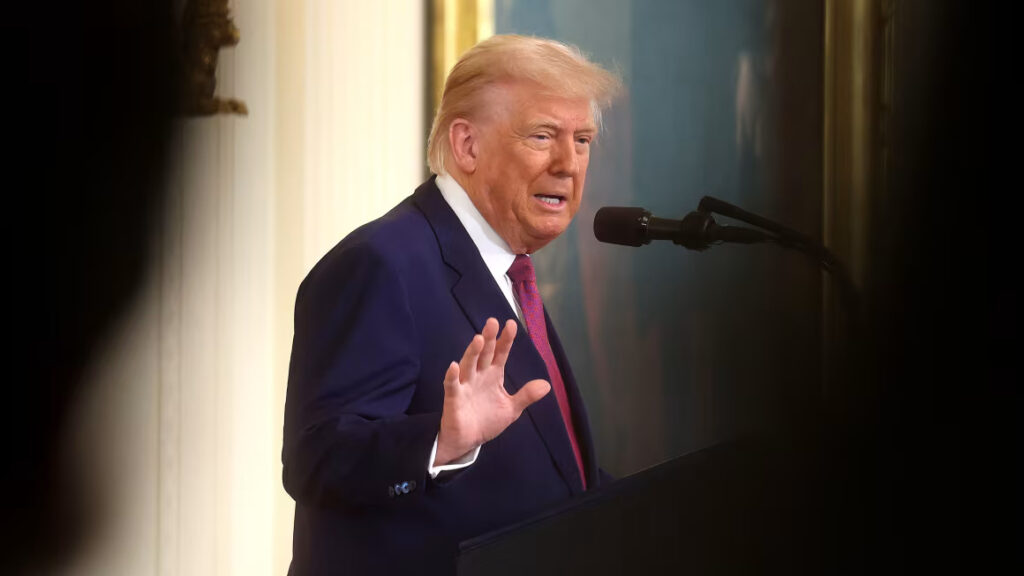President Donald Trump opposed an Israeli plan to kill Iran’s Supreme Leader Ayatollah Ali Khamenei, according to two sources, amid ongoing waves of tit-for-tat strikes between Israel and Iran as the US president is making publicly and privately clear he prefers to keep the United States out of the fray for now.
Over the weekend, one senior US official told , the Israelis had an opportunity to kill Iran’s supreme leader. The US communicated to Israel that Trump opposed that plan, the senior official said, and the plan was not executed. Trump is eager to de-escalate, wary of becoming bogged in another Middle East war and highly attuned to the changing politics of his party.
Israeli Prime Minister Benjamin Netanyahu said Sunday morning that there are “so many false reports of conversations that never happened and I’m not going to get into that” when asked about reports of the plan ’ Bret Baier on “Special Report.” A spokesperson for Netanyahu told that the reports of Trump rejecting an Israeli plan are “FAKE.”
Even as the conflict escalated, administration officials made clear they were open to continuing nuclear talks with Iran — hoping that, despite impossible odds, they could salvage a peaceful solution.
Sources familiar with the matter say Israel has spoken with the US about possibly increasing its level of involvement, though one Israeli official cautioned those conversations have not yet included “practical” discussions of the finer details. And while Trump hopes to avoid a prolonged conflict that could further destabilize the Middle East, some in the administration recognize that American military assistance may help Israel conclude its objectives more quickly, the sources said.
“We’re not involved in it. It’s possible we could get involved. But we are not at this moment involved,” Trump told on Sunday morning.
The competing interests have created a complicated dynamic for a president eager to make good on his pledge to bring peace to the world’s troubled regions.
Since Israel launched its first attack early Friday morning, the US has offered defensive support to Israel intercepting an onslaught of Iranian reprisal strikes.
But Trump has stopped well short of joining Israel’s military in its attempts to dismantle Iran’s nuclear facilities, resisting pressure from fellow Republicans to join the fight.
He said in a social media post Saturday that he felt the conflict “should end” as he continues to hold out hope for a negotiated agreement that would curb Tehran’s nuclear ambitions, even after planned talks this weekend in Oman between the US and Iranian negotiating teams were called off.
At stake is Trump’s promise to act as a global peacemaker — or, as he told his inaugural crowd in January, to “bring a new spirit of unity to a world that has been angry, violent and totally unpredictable.”
That vow has already been tested by his inability to bring about an end to the Ukraine conflict and halting efforts to stop the fighting in Gaza. Now, as a new flashpoint is threatening to spiral out of control on Trump’s watch, the commander in chief is attempting to limit US involvement.
“The U.S. had nothing to do with the attack on Iran, tonight,” Trump wrote on Truth Social late Saturday amid a fresh round of attacks in the region. “If we are attacked in any way, shape or form by Iran, the full strength and might of the U.S. Armed Forces will come down on you at levels never seen before. However, we can easily get a deal done between Iran and Israel, and end this bloody conflict!!!”
The post sent the message that Trump’s line for getting more directly involved in Israel’s assaults would be an attack on American facilities or personnel in the region. Short of that, the US’ role in the conflict so far has largely been defensive.
The Israeli operation against Iran is expected to take “weeks, not days” and is moving forward with implicit US approval, according to White House and Israeli officials.

